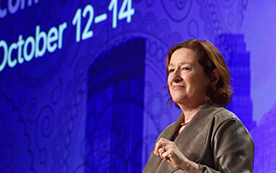
Role of Campus Pastor: The Three C’s
Communication, Connection, and Coaching — with Sam Yoon.  We caught up with Sam to pick his brain on everything a busy campus pastor must be asking themselves today. And Sam delivered! Sam Yoon absolutely gets the role of a campus pastor, because he has lived it. Just seven months ago, Yoon moved from a campus pastor role at Saddleback Church, the Southern California multisite with 15 regional campuses and four international satellites, to tackle a job with an even wider scope—that of leadership development pastor for all of Saddleback Church.
We caught up with Sam to pick his brain on everything a busy campus pastor must be asking themselves today. And Sam delivered! Sam Yoon absolutely gets the role of a campus pastor, because he has lived it. Just seven months ago, Yoon moved from a campus pastor role at Saddleback Church, the Southern California multisite with 15 regional campuses and four international satellites, to tackle a job with an even wider scope—that of leadership development pastor for all of Saddleback Church.
Break down the enormous role of a campus pastor and what they probably find themselves doing weekly.
Answer – Part of the issue is that it is “everything,” so every campus pastor can sometimes feel stuck or confused as to what their role is to focus on. I had the belief that I had to do 30 things well to be a great campus pastor. However, that just left me exhausted, tired, and anxious. I learned that there are only three things that a campus pastor really needs to do well every week.
These are:
- Communicating the vision
- Connecting people into relationships and community
- Coaching your leaders to be better
Within each of these three buckets, there are a lot that goes in it. But the main focus for a campus pastor is to share about the vision (where are we going) as well as connecting people into relationships (strategically) and helping to improve every person on their campus’ leadership.
Campus pastors have a unique role because every model is so different. There is no one-size-fits-all, but there are similarities in [the desired] leadership qualities.
What was the most fulfilling thing, for you, about being a campus pastor—that thing that kept you energized in the role?
Answer – Life change. The best part is seeing lives changed in your ministry. This can run from people coming to know Jesus or getting baptized. The stories of life change never get old. These do not have to be big life change stories, either. They can also be when people take their first faith step in whatever capacity that means for them.
I love it when people say things like, “This is my first time joining a small group or giving.” It’s in those small acts of obedience that we see growth and development. It’s beautiful to know that we as a church had a part in helping them know Jesus, face to face, or get closer to Him. It’s also great to see when marriages get healed or even when your staff grows in their leadership. We are in the people business, so it’s always a great return when you see lives changed, big or small changes.
What special blessings and challenges did you grapple with at the suburban LA site where you were campus pastor?
Answer – We were located in Torrance [LA County], and the focus was on South Bay (Torrance, Redondo Beach, Carson, Palos Verdes, etc.). Every community has specific needs but also general needs, as well.
I think a beautiful part of the South Bay is that there is so much diversity of people in a small space. It’s ethnically diverse and diverse economically. That can be a challenge because there are so many different types of people to cater to, as well. I think the challenge of supporting and helping those in need [was big]. We do a food drive twice a month to help with that. We fed over 35K during the pandemic and we saw over 1,000 people get saved.
What sources of information helped you the most in your role at the South Bay site?
Answer – I believe [that] to be an effective campus pastor, you need several things.
-
- Personal growth as a leader. This means are you growing in your own leadership. This could be through reading books, attending conferences, or listening to podcasts. The goal is to always be learning and growing.
- Having relationships and a community of other leaders. Are you connected to other local pastors to build community and learn from them? I went to a local pastors’ gathering every month to learn and just share. It’s a great place to understand the needs of the community and do it with like- minded people.
- Connection with other campus pastors. We had a regular campus pastor meeting every other week, and within that group, I had a group of three other campus pastors that we connected with. This was our time to share ideas, pray for each other, as well as just to vent. It was a safe place that allowed me to have community with those that truly understood where I was at.
- Find mentors, leaders, and coaches that can pore into you. Find people and meet with them regularly to glean from them and [let them] guide you. It takes a village to raise a healthy campus pastor.
What are some of the traits of campus pastors you know and admire, qualities you believe make them especially effective in their roles?
Answer – Having a blend of [the] highly relational and highly strategic. Usually a person will have one or the other. They will be really great with people but not able to execute strategically or in their leadership. Or they are great leaders and movers but not great with people. When you have both, then you are really able to build trust with people and get things moving.
I think another trait is just someone who loves to learn and ask questions. They are wanting to improve things and [are] not happy with the status quo. They are always trying to make things better.






